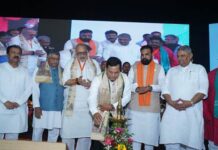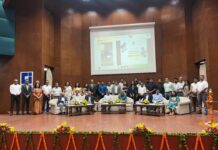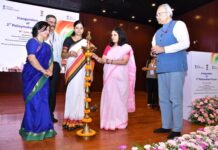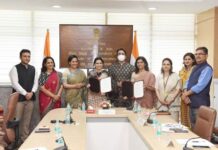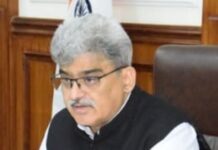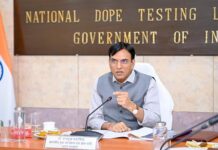JUNE 16: Union Home Minister and Minister of Cooperation, Shri Amit Shah, addressed the Annual Conference of Relief Commissioners and Disaster Response Forces of States and UTs in New Delhi, emphasizing India’s emergence as a global leader in disaster management. He credited the last 10 years under Prime Minister Narendra Modi’s leadership as transformative, achieving unprecedented milestones in disaster preparedness, coordination, and rapid response.
Highlighting the “Zero Casualty” goal, Shah stated that India’s success in recent disasters—especially during Cyclone Biparjoy in Gujarat—has amazed the world. This was achieved through coordinated efforts by central agencies, states, local bodies, scientists, and communities. Shah urged states to build on this momentum by formulating District Disaster Management Plans within 90 days, ensuring preparedness at the grassroots.
He revealed a massive financial empowerment: the combined budgets of NDRF and SDRF have tripled from ₹66,000 crore (2004–2014) to over ₹2 lakh crore (2014–2024). Additionally, a National Disaster Risk Management Fund worth ₹68,000 crore has been established, and the 15th Finance Commission has quadrupled allocations compared to its predecessor.
India has made strides with key institutions like NDMA, NDRF, and SDRF, developing apps, training materials, and SOPs. The NDRF’s battalions have grown from 8 to 16, and inter-agency coordination has improved drastically through mock drills and a “whole-of-government” approach.
Shah emphasized climate change and global warming as major drivers of disasters. He said disaster management cannot be complete without environmental conservation. He highlighted initiatives like Mission LiFE, the International Solar Alliance, and Global Biofuel Alliance, and reiterated PM Modi’s 10-point agenda for disaster risk reduction introduced on global platforms.
The Home Minister announced plans to integrate Start-up India with disaster tech development, expand inter-state mock drills, and train 1 lakh community volunteers, including 20% women, under the Yuva Aapda Mitra scheme. He also called for urgent heatwave and lightning response plans, tailored to regional experiences.
Finally, Shah urged states to actively nominate candidates for the Subhash Chandra Bose Aapda Prabandhan Puraskar, celebrating excellence in disaster risk reduction.
India, Shah concluded, is not only building infrastructure but also a culture of preparedness, with zero casualty as its guiding principle.







